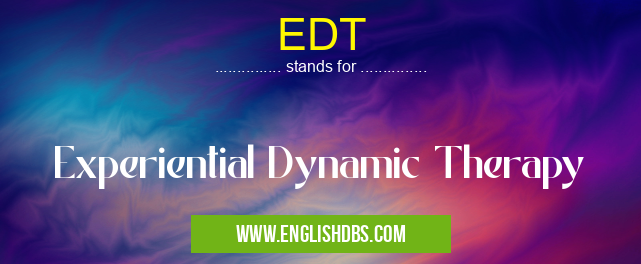What does EDT mean in THERAPY
Experiential Dynamic Therapy (EDT) is a psychotherapeutic approach that utilizes the therapeutic relationship to work through unresolved issues. It is an integrative approach to identifying and addressing patterns of behavior and emotion that were formed in childhood or earlier stages of development. EDT also focuses on how thoughts, behaviors, emotions, and sensations are interconnected in the present moment.

EDT meaning in Therapy in Medical
EDT mostly used in an acronym Therapy in Category Medical that means Experiential Dynamic Therapy
Shorthand: EDT,
Full Form: Experiential Dynamic Therapy
For more information of "Experiential Dynamic Therapy", see the section below.
Essential Questions and Answers on Experiential Dynamic Therapy in "MEDICAL»THERAPY"
What is EDT?
Experiential Dynamic Therapy (EDT) is a psychotherapeutic approach that utilizes the therapeutic relationship to work through unresolved issues. It is an integrative approach to identifying and addressing patterns of behavior and emotion that were formed in childhood or earlier stages of development.
How does EDT focus on resolving patterns formed in childhood?
EDT focuses on understanding how experiences during early childhood shape an individual's current relationships, behaviors, emotions, and responses to stressors. Past experiences can be re-experienced with new insights within a safe therapeutic space. This allows for new perspectives and resolutions to be reached more quickly than if just talking about them without utilizing the other forms of therapy offered within the EDT model such as art therapy, body awareness techniques, mindfulness meditation, etc.
How does EDT focus on thoughts, behaviors, emotions and sensations?
The primary goal of EDT is to create insight into how thoughts, behaviors, emotions, and sensations are all connected through the establishment of a safe therapeutic space for exploration. Therapists who use this type of therapy focus on helping clients gain insight into their patterns of thought by paying attention to their feelings in the present moment rather than trying to pinpoint specific events from childhood that may have led to their current state. This allows for more clarity regarding immediate needs as well as deeper understanding of longer-term issues which may be contributing to symptoms associated with them.
Are there any alternatives or complementary therapies used along with EDT?
Yes! Many therapists who practice EDT will also incorporate other modalities such as Cognitive Behavioral Therapy (CBT), Dialectical Behavior Therapy (DBT), or even Eye Movement Desensitization Reprocessing (EMDR). While each approach has its own distinct style, they all strive towards creating insight into how our current choices are shaped by past experiences while providing skillsets needed for personal growth.
Final Words:
Experiential Dynamic Therapy (EDT) offers a comprehensive way for individuals looking to understand themselves more deeply and resolve past issues in order to move forward with greater ease and confidence in life. Through its utilization of multiple facets including cognitive reframing techniques; learning mindful practices; building emotional regulation skills; exploring healthy relationships; creative expression through art therapy; and many other tools designed specifically for improved wellbeing; this type of psychotherapy can provide invaluable insights into emotional processing as well as evidence-based strategies for lasting change.
EDT also stands for: |
|
| All stands for EDT |
